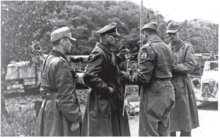Otto Fretter-Pico
Otto Fretter-Pico (born February 2, 1893 in Karlsruhe , † July 30, 1966 in Flims , Canton of Graubünden / Switzerland ) was a German officer , most recently Lieutenant General in World War II .
Life
Fretter-Pico joined the field artillery regiment "Grand Duke" (1st Badisches) No. 14 in Karlsruhe on July 14, 1914 as an officer candidate . When the First World War broke out , he came with his regiment to the Western Front and stayed there for the entire duration of the war. Interruptions were only made by being assigned to the staff of the 28th Division from February to May 1916 and then again briefly in October of the same year. In addition, Fretter-Pico completed a two-month course at the artillery school at the end of 1916. On January 27, 1915, he had already been promoted to lieutenant . From September 1917 he took over as chief of the 6th battery of the regiment and kept this position until the end of the war and was promoted to first lieutenant on October 18, 1918.
In this rank he was accepted into the Reichswehr and assigned to Artillery Regiment 13 in Königsberg . On January 1, 1921, he was transferred to the 5th Artillery Regiment in Fulda . He stayed here with small interruptions until October 1928. On February 1, 1928, he was promoted to captain . After a brief transfer to the regimental headquarters, he was in the Army Division T 1 of Truppenamt in the Defense Ministry to Berlin reassigned. Subsequently, on October 1, 1930, he was transferred to the 7th (Bavarian) medical department in Munich. On May 1, 1933, he was appointed adjutant in the 7th (Bavarian) Driving Department and on October 1, 1933 as chief of the 2nd Squadron . On September 13, 1934 he was recalled and briefly with the leadership of the III. Battalion of the Artillery Regiment Münster until October 1, 1934. He was then transferred to the Reichswehr Ministry in Berlin as inspector of artillery (Department In 4), promoted to major on January 1, 1935 and to lieutenant colonel on October 1, 1937 . On November 10, 1938, Fretter-Pico returned to Bavaria, took over the observation department 7 in Ingolstadt and completed a course in Jüterbog at the artillery school there in January 1939 .
At the beginning of the Second World War, he and his department were initially deployed during the attack on Poland . On February 6, 1940, he received command of the 297 Artillery Regiment, led it during the western campaign in France and later in the war against the Soviet Union . In the meantime he had been promoted to colonel on September 1, 1940 . He gave up the regiment on February 7, 1942, was appointed artillery commander 102 (Arko 102) and led the unit until its dissolution on December 20, 1942. Fretter-Pico was then transferred to the Führerreserve , reactivated on February 20, 1943 and entrusted with the leadership of the 57th Infantry Division and finally appointed its commander on May 1, 1943, after having been promoted to major general on March 1 .

At the end of September 1943, Fretter-Pico was appointed commander of the 148th Reserve Division , was on duty with it in southern France and was responsible for securing the Alpine passes between France and Italy after the Allies landed . Even after it was renamed the 148th Infantry Division , Fretter-Pico remained in command and was promoted to Lieutenant General on October 20, 1944. In the following years the division was involved in retreat skirmishes against the advancing Americans. In the course of the Allied spring offensive in 1945, he and most of his large association were captured by the Brazilian prisoners of war on April 28, 1945 .
After his release on July 7, 1948, he moved to Switzerland and retired there. Fretter-Pico died at the age of 73 on July 30, 1966 in Flims, Canton of Graubünden in Switzerland.
Maximilian Fretter-Pico , who was a year older than him , was also an officer and most recently artillery general in World War II.
Awards
- Iron Cross (1914) 2nd and 1st class
- Wound badge (1918) in black
- Hohenzollern Cross of Honor III. Class with swords
- Knight's Cross II. Class of the Order of the Zähringer Lion with Swords
- Clasp for the Iron Cross, 2nd and 1st class
- German cross in gold on December 11, 1941
- Knight's Cross of the Iron Cross on December 12, 1944
- General assault badge
- Medal "Winter Battle in the East 41/42"
literature
- Dermot Bradley: The Generals of the Army 1921 to 1945, Volume 4 ; Biblio-Verlag, Bissendorf 1996, ISBN 3-7648-2488-3 .
- Gassend Jean-Loup: Autopsy of a Battle, the Liberation of the French Riviera ; Schiffer, Atglen 2014, ISBN 978-0764345807 .
Individual evidence
- ↑ The Revenge of the Smoking Cobras . Mirror online. Retrieved January 5, 2010.
- ↑ a b c d Ranking list of the German Reichsheeres , Ed .: Reichswehrministerium , Mittler & Sohn Verlag, Berlin 1930, p. 147.
- ↑ a b Veit Scherzer : Knight's Cross bearer 1939–1945. The holders of the Iron Cross of the Army, Air Force, Navy, Waffen-SS, Volkssturm and armed forces allied with Germany according to the documents of the Federal Archives. 2nd Edition. Scherzers Militaer-Verlag, Ranis / Jena 2007, ISBN 978-3-938845-17-2 , p. 318.
| personal data | |
|---|---|
| SURNAME | Fretter-Pico, Otto |
| BRIEF DESCRIPTION | German officer and lieutenant general in World War II |
| DATE OF BIRTH | February 2, 1893 |
| PLACE OF BIRTH | Karlsruhe |
| DATE OF DEATH | July 30, 1966 |
| Place of death | Flims |
